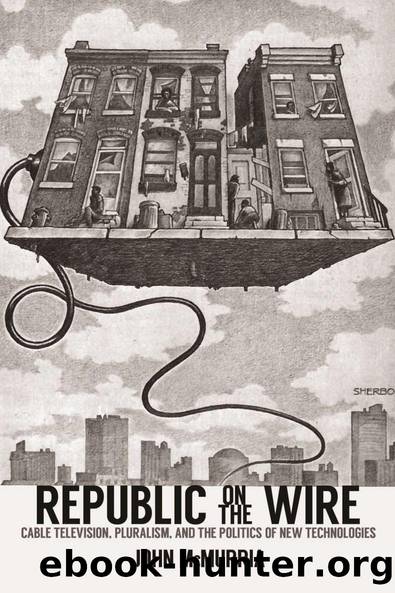Republic on the Wire by John McMurria

Author:John McMurria [McMurria, John]
Language: eng
Format: epub
Tags: History, United States, 20th Century, Performing Arts, Television, History & Criticism, Political Science, Public Policy, Science & Technology Policy, Social Science, Media Studies, Technology & Engineering, Telecommunications
ISBN: 9780813585291
Google: Y50HkAEACAAJ
Publisher: Rutgers University Press
Published: 2017-01-15T04:25:29+00:00
5
Blue Skies, Black Cultures
In a special issue of the politically left-leaning weekly newsmagazine The Nation dated May 18, 1970, freelance writer Ralph Lee Smith wrote a twenty-four-page exposé on the revolutionary potential for cable television to âinfluence every aspect of private and community life.â âAs cable systems are installed in major U.S. cities and metropolitan areas,â he wrote, âthe stage is being set for a communications revolutionâa revolution that some experts call âThe Wired Nation.ââ The revolutionary cable wire âwill provide newspapers, mail service, banking and shopping facilities, data from libraries and other storage centers, school curricula and other forms of information too numerous to specify.â The cable will âcater to specialized community, minority, and individual needs and tastes,â energize âelectoral politics,â and âperform functions of special importanceâ in âdepressed areas and ghetto neighborhoodsâ that otherwise âlive in anonymous invisibility until they are torn by riot.â1
Yet, Smith worried that âdespite the importance and imminence of this new force in society, its possibilities and problems are almost unknown to the publicâ or to âlocal, state, or national legislators.â The people with better foresight, he wrote, were the economists, engineers, and social scientists who in the past three years had initiated research on cable television at think-tanks including the RAND Corporation, industry organizations such as the Industrial Electronics Division of the Electronic Industries Association, and special task forces including one ordered by President Lyndon Johnson. Standing in the way of the Wired Nation, Smith believed, was the Federal Communications Commission (FCC), which restricted the growth of cable television in large cities, and Congress, which refused to act due to âthe power of the broadcast lobby.â âThe way forward now,â Smith recommended, was to establish a âPresidential commission on the Wired Nationâ that âshould conduct extensive consultations with economists, the business community, communications technicians, and social scientistsâ to develop âa plan for creating a national broad-band communications system in the United States during the 1970s.â2 Winning the National Magazine Award for Public Service and later published in extended form as a paperback book in 1972, Smithâs article and book gave national recognition and a brand identity to this âBlue Skiesâ enthusiasm for wiring the nation.3
Cable television histories have represented this Blue Skies period as a significant moment when âpublic interestâ priorities took over commercial profit motives in cable television development. Though overly utopic and technologically deterministic, according to these histories, Blue Skies visions identified an important role for government, non-profit foundations, and other public institutions to develop cable as a new technology for social benefit.4 I agree that this period is a significant moment in cable television history; however, I believe the significance of this period lies in accounting for how civil rights activists challenged Blue Skies assumptions about cable televisionâs potential to resolve the urban crisis in the wake of the race rebellions of the late 1960s.5 While social scientists, engineers, and non-profit foundations identified Black isolation and alienation as a significant cause of the violent protests and believed cable television could
Download
This site does not store any files on its server. We only index and link to content provided by other sites. Please contact the content providers to delete copyright contents if any and email us, we'll remove relevant links or contents immediately.
The Secret History by Donna Tartt(19090)
The Social Justice Warrior Handbook by Lisa De Pasquale(12190)
Thirteen Reasons Why by Jay Asher(8912)
This Is How You Lose Her by Junot Diaz(6887)
Weapons of Math Destruction by Cathy O'Neil(6281)
Zero to One by Peter Thiel(5802)
Beartown by Fredrik Backman(5755)
The Myth of the Strong Leader by Archie Brown(5508)
The Fire Next Time by James Baldwin(5446)
How Democracies Die by Steven Levitsky & Daniel Ziblatt(5219)
Promise Me, Dad by Joe Biden(5153)
Stone's Rules by Roger Stone(5088)
A Higher Loyalty: Truth, Lies, and Leadership by James Comey(4964)
100 Deadly Skills by Clint Emerson(4926)
Rise and Kill First by Ronen Bergman(4789)
Secrecy World by Jake Bernstein(4753)
The David Icke Guide to the Global Conspiracy (and how to end it) by David Icke(4720)
The Farm by Tom Rob Smith(4514)
The Doomsday Machine by Daniel Ellsberg(4490)
